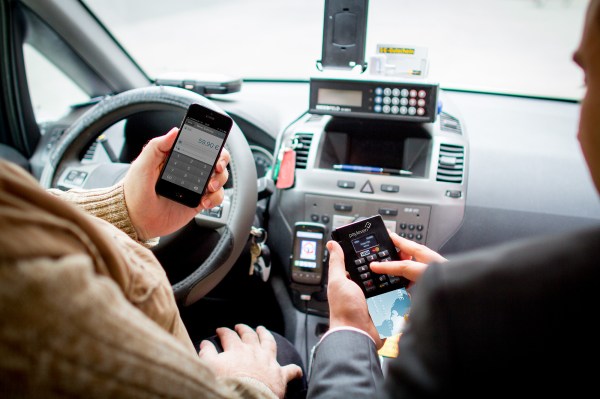Square has Starbucks and now Square-clone Payleven, which is backed by Germany’s Rocket Internet incubator/investor, has signed up Berlin taxi association — Taxiverband Berlin (TVB) — to trial its Chip and PIN payment dongle. Payleven also makes a smaller magnetic swipe dongle for taking mobile payments but taxi drivers have opted to kick the tyres of the (presumably more secure) Chip and PIN system. Payleven currently only offers this in the European countries where it operates. Its swipe & sign system is available across its entire rollout footprint.
Payleven has launched in the U.K., Germany, the Netherlands, Poland, Italy and Brazil but has not broken out any customer numbers, so it remains to be seen how much traction it’s getting for its SMB mobile payments system. In the U.K. and Germany customers of its app plus dongle system pay 2.75 percent per transaction — with no minimum revenue or monthly fees. Card payments from €1 can be accepted.
After the Chip and PIN technology was presented to TVB’s executive committee, Payleven said four executives opted to participate in the trial, each of them with between 15 and 30 taxis in their company. It estimates the system is now being used by around 100 taxis in Berlin. “We are looking forward to the partnership with the TVB and a close and longstanding cooperation,” said Payleven Co-Founder and CMO Konstantin Wolff in a statement.
Payleven said its system accepts “all kind of credit and debit cards” — the startup stresses this includes Visa cards, something rival iZettle has had some problems with. “iZettle accepts Visa but not really with their solution they offer today. They do a workaround that is actually web-based,” claimed a Payleven spokesman. “That means you get link or SMS and you need to type in your data to accept. That is not really easy and mobile. That is why Chip and PIN is necessary to use Visa in mobile payment.”
We’ve reached out to iZettle for a response and will update with any comment. Update: iZettle confirmed Visa card payments do require some extra steps — specifically, the user has to input their phone number into the iZettle app, then click on a link in an SMS which takes them to a form where they manually input their card details — but the company played down the significance of the workaround. “Due to special requirements from VISA Europe on mPos solutions, VISA card payments need to work slightly differently,” said a spokeswoman. “It is not as smooth as our standard solution, but our user feedback has so far been good from the ones who’ve tested it.” (More details on Visa payments via iZettle can be found here.)
The iZettle spokeswoman added: “iZettle is today operating in six markets with +75k users and have partners such as DZ Bank, Deutsche Telekom and EE, including investors such as American Express and MasterCard. We’ve seen a couple of other players trying to make some noise in media, but in the actual market place we haven’t seen any competition at all.”
Commenting on the Payleven trial, TVB exec committee member, Detlev Freutel, added in a statement: “The Taxiverband BerlinBrandenburg is a network with a wide range of taxi-companies who will benefit from a mobile payment solution. That is why we picked Payleven’s innovative approach for a first testing period. We think everyone will profit from it: the taxi companies, Payleven and the customers.”
Another TVB exec, Detlef Platte, said in a statement: “Payleven offers us the opportunity to allow credit card payments without a monthly fee and a bulky card terminal. Many of our members have been waiting for this opportunity, that’s why we want to try it now.”
There is no shortage of activity in the mobile payment space, especially in Europe — with NFC, dongles, wallets, cloud apps and mobile-plus-tablet systems all vying to be part of the mix. Payleven rival iZettle also just launched in the U.K, while Square is said to be eyeing international expansion.
